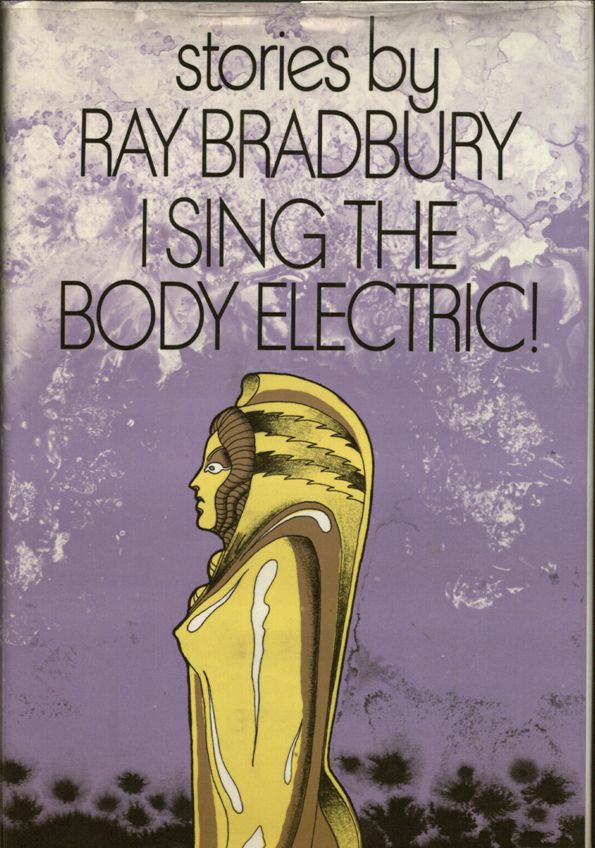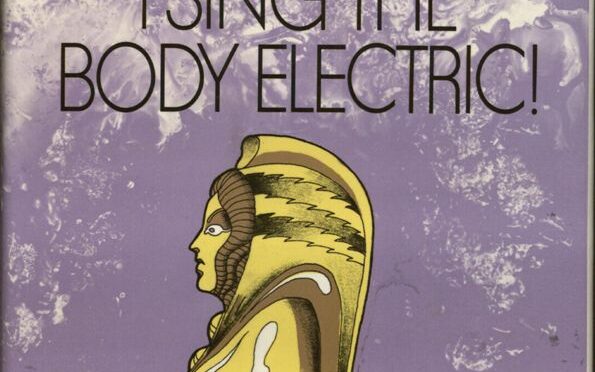
by George Pritchard
First off, hello from the United Kingdom! I have been moved over to a new office here, which has been quite the process! Nice people, but quieter than I expected. Now, to business.
Sometimes I feel like a pair of fuzzy dice — seemingly longhaired, but then you press me and it turns out I’m square underneath. Ray Bradbury has made a name for himself in the mundane world, but amongst the Galactic Journey, I may be his last full-throated supporter. Into this shaky environment comes his newest book, I Sing The Body Electric!, a title whose exclamation point is doing its darnedest to get us excited about a collection of reprints, albeit a pretty good one.

Art by Peter Bramley
“The Kilimanjaro Device” (1965)
A tribute to the memories of Hemingway. Tributes to beloved authors seem to be popular lately — see "Beyond the Gate of Dream" and Tales of the Cthulhu Mythos.
3 stars, if you like that sort of thing; 2 if you don’t.
“The Terrible Conflagration Up At The Place”
A story meant to be similar to the folktale “It Could Always Be Worse”. Would be much funnier if it wasn’t set against the background of the current strife in Northern Ireland.
That better version would be 3.5 stars, but the reality is 2, and 1 if you support Irish independence.
“Tomorrow’s Child”
A child is accidentally born into a different dimension than his human parents, making the baby appear to be a glowing blue pyramid with tendrils. While the parents want to love their child, its strange outer appearance and behavior ostracizes them from their community. But they eventually realize that their love for their child is more important to them than the rest of the world.
This story is beautiful and touching, but also rather sad. I think that Bradbury is very good at quiet, reflective moments, and I wonder if this is what growing up in the Levittowns of the world has been like for these younger hippies. Hopefully, things will improve, now that we’re moving away from the blood-soaked Piscean and into the Aquarian astrological age,.
3.5 stars.
“The Women” (1948)
During a day at the beach, a woman fights to keep her husband from being seduced and destroyed by the spirit-intelligence of the ocean. She tries valiantly, but the ocean always wins in the end.
Written during Bradbury’s horror days, I would be curious how this reads now from a female perspective, especially in concert with books like Margaret Atwood’s The Edible Woman.
4 stars.
“The Inspired Chicken Motel”
Memories of nomadic life during the poverty of the Great Depression, told from a child’s perspective. There are multiple possible meanings of the story, but I suspect that it is simply a story written to evoke nostalgia within Bradbury’s mainstream audience.
3 stars.
“Downwind from Gettysburg” (1969)
A mechanical Lincoln has been assassinated, for a second time…the plot does not strictly matter.
When they are not horror stories, Bradbury’s plots are a surface on which to draw, not a firm structure. Nobody writes chaos, true animal chaos, quite as well as Bradbury. When it was reviewed by Erica Frank in June, it seemed much less significant. With Agnew’s recent statements to the press, and the current trial of Lt. Calley, this is a story that struck much closer to home.
4 stars.
“Yes, We’ll Gather At the River”
The last day of a town that is being cut off by the construction of a highway, implied to be the 101 in California. Not SF or fantasy, but very poignant, and good reading to remember sad times in a good way.
4 stars.
“The Cold Wind and the Warm” (1964)
A warning, first off — Bradbury’s Irish impressions are terrible things. He reminds me of a beloved relative of mine, who busts out his “Grandma Murphy” impression every St. Patrick’s day, to the embarrassment of all. But unlike “The Terrible Conflagration Up At the Place” (Bradbury is never quite so dated as when he tries to be modern), there is too much good in this story to dislike it. Odd men have come to Dublin, strangely feminine and well-heeled, and these visitors wish to experience autumn, with all its cold and changing leaves. This reminded me of Lin Carter and Randall Garrett's "Masters of the Metropolis" and some of my own experiences here in Wales.
4 stars; 3.5 if you can’t forgive the impressions.
“Night Call, Collect”
The poem at the beginning is beautiful, although not quite as intellectual as it may think. A story on Mars, though a different and more cynical one than seen in his Chronicles. Possibly a more personal story, that of an old man driven mad and destroyed by the Martian masterpiece he created in his youth.
3 stars.
“The Haunting of the New”
We had one bad story set in Ireland, and one good one, and we didn't really need a third in this collection. Moreover, it need not have been set in Ireland, as it is so deeply a California tale. The story concerns the type of home colloquially known as a “dream palace”, known for its parties and orgies, which burned down in disgust at its own evil. (Feeling a bit guilty for how you exited our SF world, Mr. Bradbury?) The house is rebuilt, but rejects the attempts to continue its old life.
I am harsh on this story because it speaks to me uncomfortably.
3 stars.
“I Sing the Body Electric!” (from a 1962 script)
A sickly-sweet rewriting of “The Veldt” (Saturday Evening Post, 1950) for the mundane set. A widower and his children decide on purchasing an electric grandmother, carefully constructed. For those who could not stomach Dandelion Wine (Gourmet, 1953)
2 stars.
“The Tombing Day” (1952)
A short, broad, earthy and practical story, poking fun (not unkindly!) at the demands we put on the dead and the old; and of the ways that nostalgia is a poison if imbibed too long.
4 stars (technically 3.5; gains another 0.5 due to its placement after the worst story)
“Any Friend of Nicholas Nickelby’s Is A Friend of Mine” (1966)
A Green Town story! Hooray! I love the Green Town stories, and I sometimes wonder what it would be like to live in a place like that. It seems very alien, but also very beautiful. In fact, the Green Town stories inspired me to start calling a lunch I sometimes make for myself (PB&J sandwich, apple, glass of milk) a “Bradbury”, which makes it sound better than “George’s grocery day”.
The story itself concerns a man who arrives in Green Town, living the life and writings of Charles Dickens. He obviously cannot be — the real Dickens is long dead — but who is he, really? What does it mean to “be” someone? If one life is a failure, can it be shed for a more shining one? Has a wonderfully sweet and romantic ending, which I find unusual for Bradbury. His depictions of marriage and romantic relationships more often depict it as a punch-clock job on a good day, and nerve-grating misery on a bad one.
4 stars.
“Heavy-Set” (1964)
I have trouble believing that this story was sent to Playboy, of all publications, let alone that they published it. The story of a childlike, thirty-year-old man in a disturbing relationship with the mother he lives with, a man who is as scornful of women as he is avoidant of them, a man transforming his body into a glorious shrine to nobody and nothing. This is not Playboy, this is the anti-Playboy, the story of a man who does exactly what their overpriced pamphlet says, and it only makes him more isolated and disturbed. It made my skin crawl all the way through, and I do not know if I will read it again.
4 stars.
“The Man in the Rorschach Shirt” (1966)
Now, this story is entirely within the Playboy house style, although avoiding the general tendencies towards sexism and rape. A story of a big, boisterous but kindly intellectual fellow, who quits his psychiatric practice to wander around using his loud Rorschach shirt to help psychoanalyze passersby. There’s not much more to the story, but it’s a comfortably breezy ride.
3.5 stars.
“Henry the Ninth” (1969)
Previously reviewed by The Traveler, I enjoyed this story more than he did. Far from Bradbury’s loving descriptions of good weather, the story seemed more symbolic than anything else. The world is moving on from British homogeneity and Empire, from its old literary heroes to new ones. I do not pretend to psychoanalyze, although I hear things, sometimes.
3.5 stars.
“The Lost City of Mars” (1967)
And then, Bradbury comes out with a story that manages to blend his old strengths with the sensory depth of the New Wave, about a group of would-be adventurers seeking an abandoned Martian city. They all have their own reasons for seeking the city, and different hopes for what they will find. The bitter aftertaste of this story is the realization Bradbury can still write good SF and good horror, he can keep up with the New Wave trends, he’d just rather put out pedestrian product because—I assume—he’d rather work on his golf game. With a growing horror like the mechanical Martian city closing in, I am reminded of Kipling, who put out the beautiful “Harp-song of the Dane Women” while otherwise deep into his late-period mediocrity.
4 stars.
“Christus Apollo”
A poem for Christmas in the Space Age. A perfect end piece for the book, the year, and the decade. Would be better if it rhymed, but not by much.
3.5 stars.
Finishing this collection, I am left unsure as to whom this will please. This collection is largely reprints of already-published work, so I suppose people who want a more durable copy of his magazine stories will be happy. With the exception of the last two pieces, the seemingly random ordering of the stories means that it’s hard to grab onto anything very long.
If there’s a theme that resonates throughout the collected stories, it is the fear that your best work is long behind you, and now the only thing to look forward to is a sliding decline into irrelevance and the grave. Ray, man, if that’s how you really feel, it doesn’t have to be like this! There will always be a place for you to crash, in this new-old place across the sea.
3 stars for the collection as a whole.
[New to the Journey? Read this for a brief introduction!]




Sharp commentary, thanks. Bradbury was on a remarkable roll from about 1948 to about 1953 and it's been a slow decline since then. Incidentally, "Tomorrow's Child" sounded familar in substance but not in title, so I did some rummaging, and it's apparently retitled from "The Shape of Things" from the February 1948 THRILLING WONDER STORIES. "Night Call, Collect" is apparently a revised version of "I, Mars," from the April 1949 SUPER SCIENCE STORIES.
Thank you for your comment, and your sharp eyes. Sadly, it is telling that even two of the new stories are functional reprints.
This collection taught me two things about Bradbury that hadn't really been clear to me before.
The first is that a Bradbury collection is like a box of really rich chocolates. Try to consume more than two, three at the most, and they start to cloy and may leave you feeling a little queasy. And even rationing them, they'll get to you if you consume some every day. Plus, it's a box without a cheat sheet, so you have to bite into every one before finding out it's one with a filling you don't like.
The second is that Bradbury is very instructive for would-be writers. In fact, a bad Bradbury story may be the most instructive of all. It's like watching a drunken old magician trying to do the close-up magic that once came to him so easily. You can see everything he does and is trying to do, making it possible to see how it's supposed to go. Actually, that metaphor may be very Bradburian in itself.
Thank you for this!
I like both of your analogies, although I find Lin Carter more of a "chocolate box" author than Bradbury. The image of the failing magician is painfully accurate, however.
Excellent analysis of each story.
I'll always have a soft spot in my heart for Bradbury, although it cannot be denied that he can easily fall into self parody. Every once in a while he does something that makes you amazed that it's really a Bradbury story. In this collection, it's "Heavy-Set."
Besides the Irish stereotypes in "The Cold Wind and the Warm," some readers might be put off by the stereotyping of another group of individuals (which is the whole point of the story, so I can't say more.)
Thank you for your comment!
I agree that "The Cold Wind and the Warm" might put some readers off, but I decided that since I am part of the group in question and didn't find it troublesome, I didn't want to comment on it. Although, it's certainly more hopeful than you might expect in real life, sad to say.
Some nicely turned sentences and judgments from this reviewer. I'll watch out for more commentary from Mr. Pritchard.
Thank you, I look forwards to writing more for the Journey!